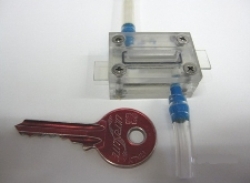Researchers have developed a novel biosensor device that can accurately detect toxicity. The "Dip Chip" device is the result of collaboration between engineering and biology.
 Dip Chip biosensor device
Dip Chip biosensor device
The chip was developed by the Vice Dean of Tel Aviv University's Faculty of Engineering, Prof. Yosi Shacham-Diamand, and a researcher at the Institute of Life Sciences at the Hebrew University of Jerusalem, Prof. Shimshon Belkin. The study has been published in Sensors and Actuators B: Chemica, Electrochimica Acta and other journals.
Water and food supply can get contaminated due to natural poisons or man-made toxic chemicals. This contamination, when ingested, may cause minor illnesses or death. Food tasters, fish and biosensors have been used over time for detecting toxins.
The novel "Dip Chip" device emulates how humans or animals will biologically respond to toxic chemicals. It contains microbes that display a biological reaction, which can be converted into electronic signals that can be analyzed. On further development, the chip may be connected to mobile devices, including tablets and mobile phones, which can lead to a cost-effective and simple solution for military personnel and campers.
Genetically modified microbes were developed in Prof. Belkin's lab. When these get exposed to toxins they react biologically, producing a chemical signal that gets converted into an electrical current that can be read and identified by a device.
The Dip Chip differs from other detectors that can identify only particular toxic chemicals. It provides the overall toxicity and measures all the toxic materials.
The novel chip may be used in the pharmaceutical, cosmetics industries and also for monitoring water supplies in real-time.